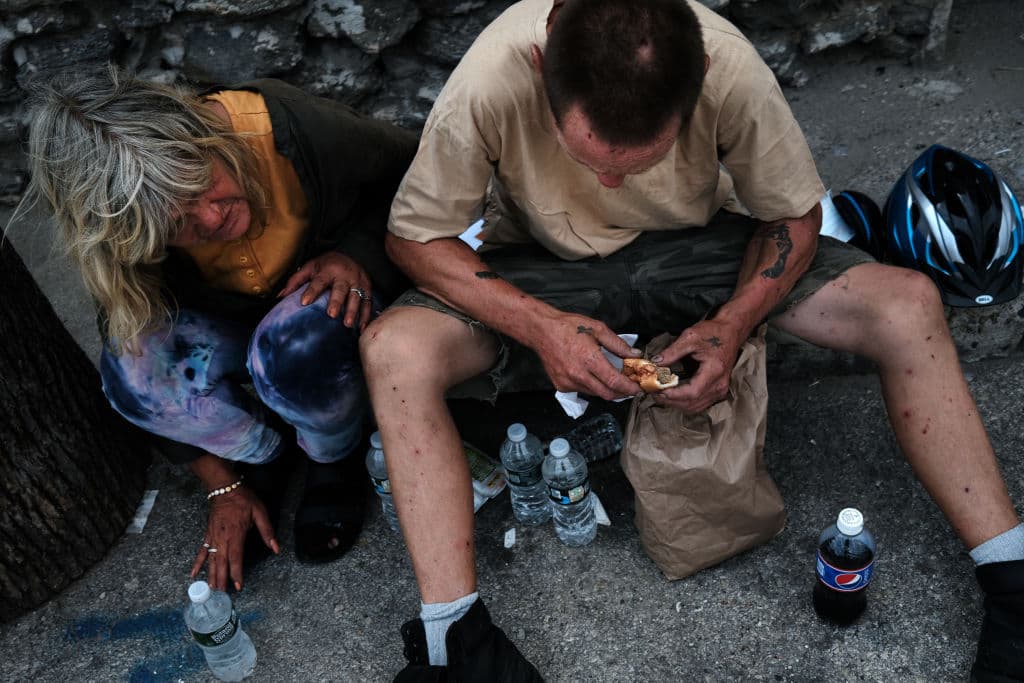City of Brotherly Love Weighs Ban on Drug Injection Sites as Its Kensington Neighborhood Reels From Opioid Crisis Sweeping Nation
A crackdown on the facilities, which critics say promote illegal drug use, could create ripple effects nationwide.

Philadelphia’s City Council will vote today whether to ban facilities that make it safer for addicts to inject illegal drugs, as footage of open drug use and rampant crime at the city’s Kensington neighborhood draws international concern.
The bill, expected to pass by a majority vote, aims to amend Philadelphia’s zoning code to prohibit “injection sites for narcotics” in nine of the city’s ten districts. Philadelphia’s mayor, Jim Kenney, has not yet indicated whether he would sign the bill.
If the measure is passed to ban the centers at Kensington and the surrounding areas — often called “ground zero” for the country’s opioid epidemic — and the mayor signs it, the decision could create ripple effects in attitudes towards legal injection sites nationwide.
So-called supervised injection sites are used in other countries but have only been used at New York City in America so far. Supporters say the sites prevent overdose deaths by offering addicts medical help and educational resources. Opponents fear the sites promote illicit drug use and negatively affect surrounding areas.
While Mayor Kenney did not indicate whether he would sign the bill, his spokeswoman expressed concern over its timing. “The overdose crisis in Philadelphia takes more than 1,400 lives every year and as this crisis worsens, we need more tools and strategies to save lives,” Sarah Peterson tells The New York Sun. “This is not the time to limit our options,” she added.
One council member, Quetcy Lozada, who represents Kensington and introduced the bill, tells the Sun the community does not want supervised injection sites to open. “As the people’s representative for the 7th district in City Council, it is my duty to advocate for their quality of life and make sure they have a say in all decisions pertaining to developments in our district,” Ms. Lozada says. “By introducing this bill, I am fulfilling my promise and assuring that the voices of my community are heard.”
Another council member, Kendra Brooks, who opposes the bill, tells the Sun that her “focus is on finding the strategies that will prevent people from dying” and that she “can’t support permanently banning a tool that is proven to save lives.”
Philadelphia nonprofit Safehouse has been engaged in years-long legal battles to open a safe injection site at Philadelphia. A federal court ruled that operating sites for the unlawful consumption of controlled substances is a federal crime, violating the 1980s-era “crack house statute,” as the Sun has reported.
Safehouse leaders argue that they have a religious right to open the site, citing the Judeo-Christian ethical requirement to preserve human life above all else. Philadelphia’s overdose crisis calls for trying everything that could work, Safehouse’s co-founder, Ronda Goldfein, tells the Sun.
“This is the time where we should be all hands on deck,” Ms. Goldfein says, pointing to the use of safe injection sites in other countries. “And instead, City Council wants to take off the table an initiative that has been successful in more than 120 locations for more than, probably at this point, more than 35 years.”
Regardless of today’s vote, Ms. Goldfein says, Safehouse will continue pursuing legal ways to open a facility.
“Why wouldn’t you want a facility where people would come regularly, maybe even multiple times a day, because that’s what drug use looks like these days, and they could be in front of trained medical professionals who could look at their wounds regularly?” Ms. Goldfein asks. “Saying we can’t use a tool to address the epidemic in Kensington is not going to make the drug trade go away.”
Safe injection sites would require many groups “to be on board,” including law enforcement on the streets, to be an effective tool, a clinical psychologist who works with Kensington patients, Geri-Lynn Utter, tells the Sun.
“If you’re going to get a safe injection site, it doesn’t matter where it is, how nice it is, how equipped it is from a potential safety and harm reduction standpoint, if people who use drugs are still able to use on the street,” Ms. Utter says, adding that Philadelphia has a lot of work to do in both treatment and law enforcement.
Because the animal tranquilizer that often is mixed with other illicit drugs, xylazine, is so prevalent in Philadelphia’s drug market, a safe injection site would have to be prepared to care for patients suffering from other health conditions, Ms. Utter says.
“Everyday, I’m learning something new about xylazine because again, you have to think, it’s a veterinary sedative that was not developed to be used in humans, yet it is,” Ms. Utter says.
Addressing the opioid and xylazine crisis “is a conversation that we need to keep having, not one that we just need to shut down,” Ms. Utter says. She urged people from all political affiliations and backgrounds to talk about the issue.

